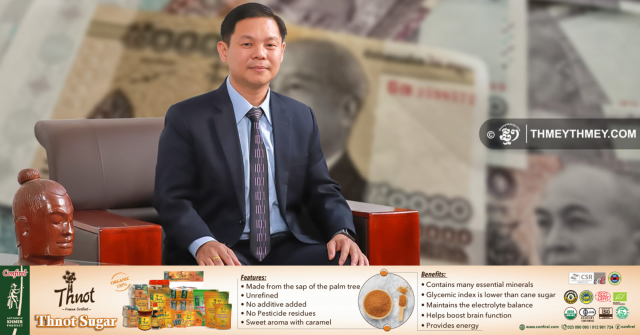Banking is a Source of Investment Capital for People when Used Wisely

- By Ou Sokmean
- January 6, 2024 5:00 PM
PHNOM PENH — While some people believe that taking out loans at banks and microfinance institutions add to their income, others see loans as burdens.
According to Ky Sereyvath, a researcher in economics at the Royal Academy of Cambodia, banking is in fact a source of investment capital for people and not a burden.
The banking and microfinance sector play an important role in the country’s economic growth and also in people’s lives when they use loans wisely, he said during an interview.
Ou Sokmean: How do you think the banking and microfinance sector can help people?
Ky Sereyvath: The banking and microfinance sector contributes significantly to the nation’s growth when people take out loans from those institutions to build wealth and invest properly because loans can serve as capital for their undertakings. However, some take out loans to invest in risky activities that can cause them problems later. For instance, they get a loan to purchase land, and yet, the land has no valid ownership title. Although they have not acquired ownership of the land they purchased, they still have to repay the loan to the bank. Then, they take loans to buy luxury cars to make themselves look cool, and buy jewelry, etc. Thus, this is called “expenditure,” not “investment.” Once they receive no income, they need to deal with the financial loss. In contrast, if they take out loans to invest, they will be able to generate income and repay banks on a regular basis.
Therefore, borrowers are required to prepare specific business plans and understand the terms and conditions before taking out loans. Some borrowers avoid some microfinance institutions with tight conditions. However, consequences are inevitable when they go to take out loans from institutions with easy terms and conditions. Once they face problems, they have no choice but to try informal loans. And at this point, informal loans come up with many consequences for borrowers.
Ou Sokmean: As you explain, the banking and microfinance sector can help people. However, some consider loans from banks and microfinance institutions as burdens on families’ finances. So would you explain that loans are not the burden, the problem being when loans are not put to good use.
Ky Sereyvath: There are two factors. The first one is that banking and microfinance institutions are the main source of funds for business and investment. This is the first factor. So, banks do not cause any harm to people. Second, we need to understand that all banks and microfinance institutions are under the control of the National Bank of Cambodia (NBC). NBC ensures that the interest rate should not be over 1.5 percent per month, or 18 percent per year. People take out loans to conduct their business. They soon face problems when they have no specific business or no market for their business. Some problems arise in businesses. For instance, borrowers take out loans to raise ducks, and when their ducks die, they get losses. Some take out loans to purchase cars to transport goods. They will also get losses when a traffic accident happens. Those risks come up in their personal businesses. Others heavily rely on their monthly wages to pay their bank loans. They take out loans to purchase cars or motorcycles. When factories shut down such as during the pandemic due to the COVID-19 outbreak, they lost their monthly wages and could not repay their loans, which affected their financial situations.
All these result from projections on their repayments, as to whether they are able to repay their loans regularly or not. Talking about credit officers, some of them find many ways to persuade people to take out loans for their own personal benefits such as reaching their targets, competing with other officers, or even passing their probation periods for their jobs. We have seen some cases of credit officers persuading people to take out loans, and when the borrowers were not able to repay them, the credit officers did not attempt to coordinate with the institutions. To protect their reputations, a small number of credit officers will approach borrowers directly to force them to repay. In some cases, this has led to violence or conflicts, which have been mentioned on social media. This also affects microfinance institutions’ reputation. Regarding this, I would like to clarify that this is not the institutions’ problem or the banking system’s conditions: It is the problem of the individuals themselves. Therefore, people should understand that the problem is not coming from the institutions. Banking and microfinance institutions are the main sources for loans. I also take out loans, I never face any problem due to the banks. When we foresee benefits from one particular business but we don’t have the capital, we therefore take out loans from banks. And we are able to repay the loans successfully. When we do not use loans effectively, problems will arise in our business.
Ou Sokmean: From your experience, as you have mentioned you also take out loans from banks, and as an expert in the field of economics, do you have any advice for people regarding using loans effectively and avoiding debt crisis?
Ky Sereyvath: When it comes to taking out loans from the banks, we need to think carefully about our income.
Let’s say that our income is $100, and we do not have 100-percent hope in our business outcome, which means 50/50. So, if our income is $100, we need to think as if we only have $50…If we have only $50, we need to also think about our family expenditures. When we spend $30 for family expenditures, we only have $20 to repay the loan. However, we should not repay the loan with that $20; we need to keep $10 as savings in case some emergencies happen at an unexpected time. So, we only have $10 to repay the loans, and therefore we have to think thoroughly how much we should borrow from the bank when we have only $10 to pay back each month. By doing this, we can use loans effectively and not have problems affecting our income and our family. Otherwise, problems will be inevitable.
Originally written for ThmeyThmey News, the story was translated by Rin Ousa for Cambodianess.















